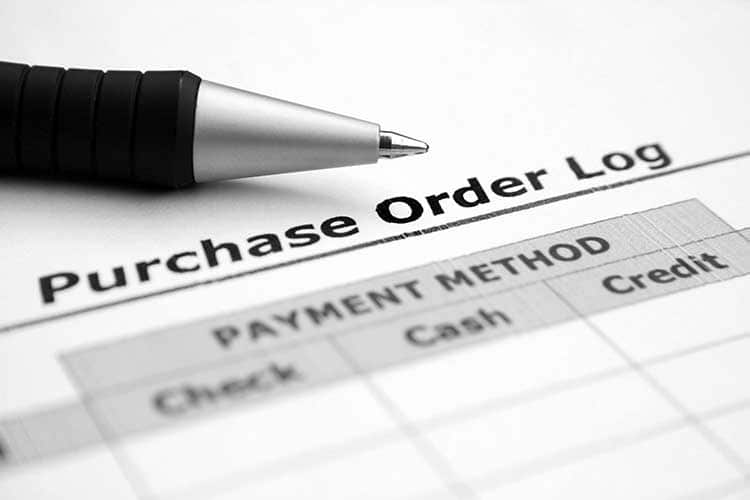-
Creating A Purchase Order System For Your Small Business
If you’re running a small business, purchase orders might seem like an unnecessary step that just adds to your paperwork load. Many small businesses don’t even use purchase orders, preferring to rely on invoices from the seller to document orders. After all, you might think, why go to the trouble of generating a record of your purchase request when the seller is going to send you something with similar information?
That plan only works if nothing goes wrong with the order. What happens when your supplier sends the wrong item? Or they send too many or too few of the items you ordered? Or if they leave something off the order that you needed to meet a deadline? Without a record of your original purchase, getting these problems sorted out is time-consuming. Sometimes you can’t fix the issue at all.
Ignoring purchase orders can only work short-term and only while your business is relatively small. In the long term and as your company starts to grow, documenting your purchases becomes more and more important. Every company needs to make purchases. And the more purchases you make, the more vital it becomes to have a small business order management system.
Purchase orders (POs) give you a way to track purchases and protect your business legally in the event of a problem with the seller. POs can be a big asset to your small business. However, if you start using purchase orders without a reliable purchasing system in place, POs can also become quite a hassle. That’s why it’s so important to start out with a purchase order system that works for you. This article will answer questions about purchasing software for small businesses and help you decide how to implement a PO system that works for your company.

Do Small Businesses Use Purchase Orders?
Purchase orders are a document buyers send to sellers containing a request for an order. Once a seller accepts the purchase order, the PO serves as a legal agreement between the buyer and seller. Typically, the purchase order includes a detailed list of the type, quantity, and price of items your business is ordering.
Very small businesses can usually get away with not using purchase orders, but as your business grows POs become more important. The main difference between a purchase order system in a large company and a small business is how many people are involved. Both sizes of companies need a way to keep track of purchases, but larger companies work on a larger scale.
In larger companies, there’s a much wider range of employees involved in procurement and purchasing, which means there are more opportunities for something to go wrong. Large companies need a purchase order system that can track purchasing across the company. It helps them prevent fraud, control employee purchasing, and avoid duplicate purchases.
Depending on the number of employees in your small business, you might not need all those features. But you’ll still reap the benefits of using purchase orders no matter how small your company is. A small business order management system helps you keep track of orders, inventory, and important financial data related to purchasing.
Why Should I Use Purchase Orders?
Before you go to the effort of implementing purchasing software for your small business, you probably want to know why POs are so important. Here are five great reasons for using purchase orders in a small business. For more information, check out our article 10 Important Ways That Using Purchase Orders Benefits Your Company.
1) Save Money
In a business of any size, it’s easy for communication to break down enough for two people to place orders for the same thing. A purchase order system helps you avoid duplicate orders. If you use itemized purchase orders, it’s easy to pull up records for recent purchases.
2) Protect Yourself
Purchase orders are a legal agreement between buyers and sellers. This means they can protect you from price increases and any legal disputes that arise regarding an order. For example, if the price changes between the time you submitted your purchase order and the time of delivery, you’ll have a record of the agreed-upon price.
3) Simplify Records
Tracking incoming orders by matching them to POs in your record-keeping system helps simplify inventory management. Having POs lets your company take this matching a step farther with 3-way matching between POs, invoices, and goods received records. Also, accurate purchasing records are an asset in dealing with audits. Some types of audits require proof that a manager approved procurement decisions, and purchase orders are the best documentation for that.
4) Increase Accuracy
Purchasing software for a small business, particularly software with automation technology, improves the accuracy of your records. The software also makes it easy to enforce your business’s purchasing policies. This is particularly useful when your business grows large enough that it’s hard to remember all the best practices you’ve implemented for purchasing. It’s also a big help for training new employees or introducing new policies.
5) Plan Better
Purchase orders make it easier to look up repeat orders of similar or identical items. This lets you track what your business purchased when, and for how much. These accurate, easy-to-access records about how your company spends money are invaluable for budgeting and financial planning.

What is A Purchase Order System?
“Purchase order system” simply refers to your business’ process for managing purchase orders. Some businesses start with a manual, paper-based system because it seems easier. In the long run, keeping up with all the associated paperwork becomes difficult.
A single purchase can involve quotes, order acknowledgments, miscellaneous notes, packing slips, and invoices in addition to the purchase order. That’s a lot of paper to keep track of. On top of that, the more paper-based records you accumulate the harder it is to maintain in a system that makes it easy to locate specific files. That’s why more and more companies, big and small, are transitioning to digital, automated procurement.
The best small business order management systems make generating POs quick and simple. They’ll also track the associated paperwork for each order and match POs with relevant documents, such as invoices. And the advantages of an automated purchase order system don’t stop there. Business process automation simplifies record keeping and protects records from loss, damage, or accidental destruction due to something like a fire or flood. With this sort of system, you’ll also cut back on processing expenses and the amount of paper used. Digitizing procurement is a great step toward a paperless office.
How Do I Use POs In My Business?
At this point, you might be wondering why you’d want a fancy purchase order system. If all you need from a PO is a document that states what you want to purchase then you could type it up in any program, right? But there’s a little more to it than that. If you want to use purchase orders most effectively, setting up a purchasing system—preferably an automated or partly automated one—is the option that will work best for your small business.
An automated system makes it easy to generate purchase order numbers for each PO document. These unique numbers make it easy to look up specific POs in the system and match them to corresponding invoices. This feature is also going to help streamline accounts payable since you can quickly check that each invoice matches a purchase order before paying it.
A good purchase order system doesn’t just generate POs. It also helps streamline the entire purchasing process. For businesses large enough to have multiple employees involved in purchasing, having a centralized system helps prevent duplicate orders for the same items. And if you want to designate one employee as purchasing manager, the system makes it easy for others to submit purchase requests for approval.
Another way a purchasing system helps your business is by managing vendors. A reliable automation system helps log and track vendor information. It also makes it easy for you to submit orders to your vendors directly through the software.

Which Purchase Order System Should I Use?
The best purchase order systems for a small business will scale to your exact needs. You don’t need to pay for a huge, complicated system designed to work on a large scale. However, you also don’t want to get stuck with a system that can’t meet your needs if/when your business starts to grow. Cloud-based systems, like NextProcess’ Purchase Order Module, scale to a company’s needs. Pricing is based on how your small business uses the purchasing software, so you only pay for what you need.
Once you have an automated small business order management system, using purchase orders will be simple. You can set up purchasing guidelines within the system, and it will automatically generate POs when you or your employees place an order through the software. Automated PO software also stores information in a searchable way that updates in real-time. You can check your purchase records anywhere, anytime on your computer, tablet, or smartphone. It also keeps your information secure and only authorized users can access the records.
If you’re implementing a new purchase order system, start out right with easy-to-use automation software tailored to your business. Contact us and we’ll give you a free demonstration of NextProcess’ purchase order system. That’ll let you see first-hand how our user-friendly system will work for you with no strings attached. And if you decide to go ahead with implementing our purchasing system, we’ll be there with you through every step of the set-up process to make certain our software works perfectly for your company.